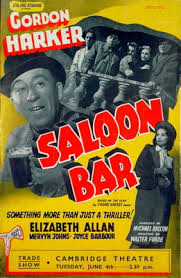| Saloon Bar | |
|---|---|
 | |
| Directed by | Walter Forde |
| Written by | John Dighton Angus MacPhail |
| Based on | Saloon Bar by Frank Harvey |
| Produced by | Michael Balcon Culley Forde |
| Starring | Gordon Harker Elizabeth Allan Mervyn Johns |
| Cinematography | Ronald Neame |
| Edited by | Ray Pitt |
| Music by | Ernest Irving |
Production company | |
| Distributed by | Associated British Film Distributors |
Release date |
|
Running time | 76 minutes |
| Country | United Kingdom |
| Language | English |
Saloon Bar is a 1940 British comedy thriller film directed by Walter Forde and starring Gordon Harker, Elizabeth Allan and Mervyn Johns. [1] It was made by Ealing Studios and its style has led to comparisons with the later Ealing Comedies, unlike other wartime Ealing films which are different in tone. [2] It is based on the 1939 play of the same name by Frank Harvey in which Harker had also starred. [3] An amateur detective tries to clear an innocent man of a crime before the date of his execution.